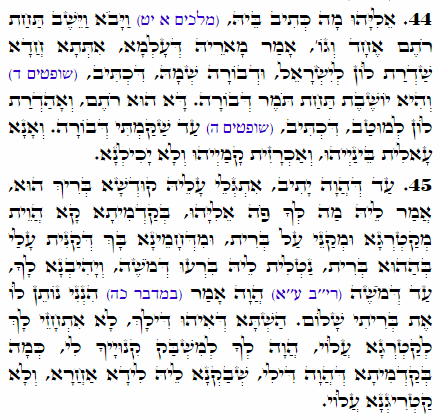Daily Zohar # 2380 – Ki Tisa – Elijah's prayer.
Daily Zohar 2380
Daily Zohar 2380

.
Hebrew translation:
45. עַד שֶׁהָיָה יוֹשֵׁב, הִתְגַּלָּה עָלָיו הַקָּדוֹשׁ בָּרוּךְ הוּא. אָמַר לוֹ, מַה לְּךָ פֹה אֵלִיָּהוּ? בָּרִאשׁוֹנָה הָיִיתָ מְקַטְרֵג וּמְקַנֵּא עַל הַבְּרִית, וּמִשֶּׁרָאִיתִי בְּךָ שֶׁקִּנֵּאתָ עָלַי בְּאוֹתָהּ בְּרִית, נָטַלְתִּי אוֹתָהּ בִּרְצוֹנוֹ שֶׁל מֹשֶׁה וְנָתַתִּי לְךָ, עַד שֶׁמֹּשֶׁה הָיָה אוֹמֵר, (במדבר כה) הִנְנִי נֹתֵן לוֹ אֶת בְּרִיתִי שָׁלוֹם. עַכְשָׁו שֶׁהוּא שֶׁלְּךָ, אֵינוֹ רָאוּי לְךָ לְקַטְרֵג עָלָיו, הָיָה לְךָ לְהַשְׁאִיר אֶת קִנְאָתְךָ לִי, כְּמוֹ בָּרִאשׁוֹנָה שֶׁהָיְתָה שֶׁלִּי, נָתַתִּי אוֹתוֹ לִידֵי אַחֵר וְלֹא קִטְרַגְתִּי עָלָיו.
.
Zohar Ki Tisa
For the background story I suggest reading 1 Kings 18 http://www.mechon-mamre.org/p/pt/pt09a18.htm
In short, the story tells what lead to the killing of 450 idol worship prophets by Elijah. They were serving King Ahab and Elijah was running away from the wrath of the king.
Note: In chapter 18 we read how God answered Elijah’s prayer. It was the time of the afternoon and many people read “Elijah Opened” from Tikunei Zohar, before praying the afternoon prayer of Mincha. We Also mention that event during the Selichot that we do every morning before and during Rosh Hashanah and Yom Kippur prayers. As God answered Elijah’s prayer so we want to use the same channel opened by Elijah for our own prayers.
1 Kings 19:4
“וְהוּא-הָלַךְ בַּמִּדְבָּר, דֶּרֶךְ יוֹם, וַיָּבֹא, וַיֵּשֶׁב תַּחַת רֹתֶם אחת (אֶחָד); וַיִּשְׁאַל אֶת-נַפְשׁוֹ, לָמוּת, וַיֹּאמֶר רַב עַתָּה יְהוָה קַח נַפְשִׁי, כִּי-לֹא-טוֹב אָנֹכִי מֵאֲבֹתָי”
“But he himself went a day’s journey into the wilderness, and came and sat down under a juniper tree; and he requested for himself that he might die, and said, “It is enough; now, O YHVH, take my life, for I am not better than my fathers.”
Elijah was The Zohar reveals that Elijah sat under a tree, reflecting on his mission, and the unsuccessful outcome of making the people to repentance. He asked God to take his life for his failure. The tree that Elijah was sitting under was the tree that the judge Deborah was sitting under the same tree. In her time the land and the people were in peace.
Judges 4:5
“וְהִיא יוֹשֶׁבֶת תַּחַת-תֹּמֶר דְּבוֹרָה, בֵּין הָרָמָה וּבֵין בֵּית-אֵל–בְּהַר אֶפְרָיִם; וַיַּעֲלוּ אֵלֶיהָ בְּנֵי יִשְׂרָאֵל, לַמִּשְׁפָּט.”
“She used to sit under the palm tree of Deborah between Ramah and Bethel in the hill country of Ephraim; and the sons of Israel came up to her for judgment.”
There’s a famous book of the Ramak (Rabbi moshe Cordovero), named “the Palm of Debora”. It’s the ultimate book about becoming righteousness and I highly recommend reading it.
To be continued in the next DZ
{||}

 Previous: Ki Tisa
Previous: Ki Tisa
